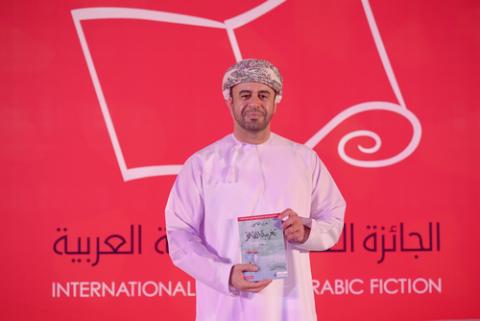The Water Diviner wins 2023 International Prize for Arabic Fiction
21/05/2023

The Water Diviner by Zahran Alqasmi was announced today as the winner of the 2023 International Prize for Arabic Fiction (IPAF). The novel, published by Rashm, was named as this year’s winner by Chair of Judges Mohammed Achaari during a ceremony in Abu Dhabi that was also streamed online.
In addition to being awarded USD $50,000, funding will be made available by IPAF for the English translation of The Water Diviner, and Alqasmi can expect to see an increase in book sales and international recognition.
Mohammed Achaari, Chair of the 2023 Judges, said:
The Water Diviner by Zahran Alqasmi explores a new subject in modern fiction: water and its impact on the natural environment and the lives of human beings in hostile regions. Blurring the boundaries of reality and myth, the novel’s precise structure and sensitive poetic language are the conduit for compelling characters like the water diviner, who plays an essential role in people’s lives, yet simultaneously inspires their fear and revulsion. The Water Diviner transports us to the world, little known in the Arabic novel, of the riverbeds and the aflaj (water channels) of Oman, showing how natural forces influence the relationship between individuals, environment and culture.
Professor Yasir Suleiman, Chair of the Board of Trustees, said:
Rooted in its socio-environmental milieu, The Water Diviner delves into the social fabric of Omani village society that lives its life at the mercy of the subterranean ebb and flow of water. Entangled in the accidents of his life, the water diviner lives through the calamities of his community, suffering as it does in equal measure from the tumultuous nature of water as an environmental force. The novel takes the reader into a world dominated by vulnerability and ready-made modes of thinking. Written in exquisite language suffused with the local cadences, the novel charms the reader with its narrative flow and poetic impulse.
Set in an Omani village, The Water Diviner tells the story of water diviner Salem bin Abdullah, employed by the community to find and track springs hidden deep within the earth. At its centre is the aflaj, the irrigation system which is inextricably linked to village life in Oman, and has become the inspiration of many stories and legends. Alqasmi concurrently explores both the life-giving qualities of water, and its potential to bring peril and death through scarcity or flooding. Salem’s whole life has been marked by a profound connection with water: his mother drowned, and his father was buried when the roof of one of the water channels – aflaj – collapsed. Through his vocation, the diviner himself ends up imprisoned in a water channel, battling for his life. In its Arabic meaning, a “narrator” is someone who – literally – “waters” people and satisfies their thirst; the novel restores this original function.
Another major force in Salem’s story are the female characters. In an interview for the International Prize for Arabic Fiction’s website, Alqasmi explained: “Historically, women gave life to humanity; they initiated change in civilisations and agriculture; they caused many important historical transformations. So, I tried to focus on that in the book, on how women also caused changes in the life of the main protagonist”.
Zahran Alqasmi is an Omani poet and novelist, born in Dima Wattayeen in the Sultanate of Oman in 1974. Prior to The Water Diviner (2021), he has published three novels - Mountain of the Horseradish Tree (2013), The Sniper (2014), and Hunger for Honey (2017) - as well as ten poetry collections, and Biography of the Stone 1 (short story collection, 2009) and Biography of the Stone 2 (non-fiction, 2011).
Alqasmi is the first Omani author to win the International Prize for Arabic Fiction.
The Water Diviner was selected by the judges from those submitted to the prize as the best novel published in Arabic between July 2021 and June 2022. It was chosen from a shortlist of six by authors from Algeria, Egypt, Iraq, Libya, Oman and Saudi Arabia. All six shortlisted finalists — Siddik Hadj-Ahmed, Azher Jirjees, Najwa Binshatwan, Miral al-Tahawy, Fatima Abdulhamid, and Zahran Alqasmi — will each receive USD $10,000.
The panel of five judges was chaired by Moroccan writer and novelist, Mohammed Achaari. Joining him on the judging panel were Egyptian academic and novelist Reem Bassiouney, Algerian novelist, researcher and journalist Fadhila El Farouk, Swedish university professor and translator Tetz Rooke, and Omani writer and academic Aziza al-Ta’i.
